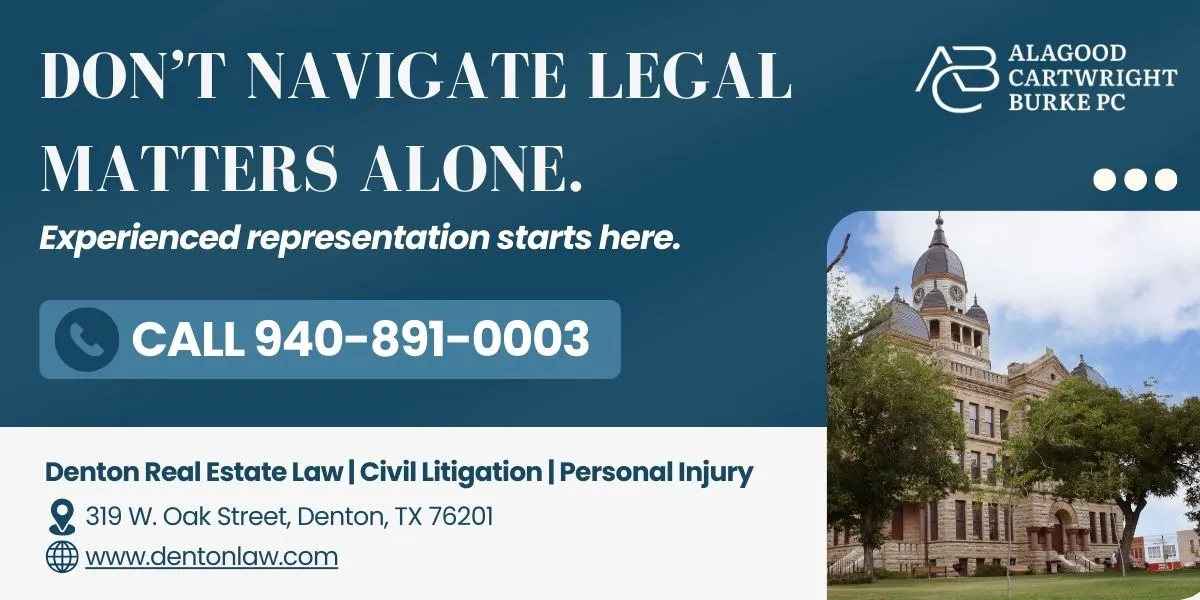Denton Car Accident Lawyer

Denton Car Accident Attorney
Were You Injured In A Motor Vehicle Accident?
Motor vehicle accidents come in all forms, including car wrecks, truck and 18-wheeler accidents, motorcycle accidents, boating accidents, and even airplane crashes.
Regardless of the type of accident you were involved in, one thing is certain if you are reading this: It was a traumatic event that has affected virtually every area of your life. If you’re in an accident, especially one that has caused you any amount of pain, seeking an experienced Denton car accident lawyer is necessary.
There is probably a good likelihood that you are in pain, are having difficulty sleeping, jump or panic every time you hear a loud sound while riding or driving in a car; or you are worried about how you are going to pay your medical bills, worried about how you are going to feed yourself and your family while you are unable to work, worried about repairing or replacing your car and frustrated with dealing with the defendant’s insurance company, just to name a few.

Is It Worth Seeking Legal Counsel?
Trying to navigate medical bills and missed time at work on top of your injuries can be extremely overwhelming, especially when you aren’t at fault for the accident. When someone else’s negligence caused your accident, you have the legal right to pursue full compensation for your losses.
Taking the time to research law firms in your area and choosing knowledgeable legal counsel is vital to your health and future well-being. Here at Alagood Cartwright Burke PC, we represent injured drivers, passengers, cyclists, and pedestrians throughout Denton County and North Texas. As experienced Denton personal injury lawyers, we provide strategic and empathetic legal representation to hold at-fault drivers and insurance companies accountable.
Dedicated To Helping You
Remember that there is help available. At {%1n}, you can schedule a cost-free consultation with a board-certified Personal Injury Trial Attorney or a board-certified Civil Trial Law Attorney who can evaluate your case and answer many of the questions that you probably have which have caused you anxiety during this uncertain time.
Denton Car Accident Statistics
In Denton in 2023, a total of 2,804 motor vehicle crashes occurred, with 16 of those being fatal crashes. Crashes with suspected minor injuries totaled 499, while 70 crashes involved suspected major injuries. This data remains steady from the year before, with 2,824 crashes in Denton in 2022. In Texas that year, a total of 250,335 people were injured in crashes.
High-traffic areas and roads like I-35E, I-35W, and U.S. Highway 380 can lead to a higher volume of crashes due to congestion and prolonged exposure periods, as well as out-of-town drivers not being familiar with those areas. Alcohol-impaired driving remains a serious issue. In 2023, 609 crashes occurred in Denton due to alcohol, resulting in 10 fatalities.
These statistics help highlight the very real danger that driving poses and how important it is to stay vigilant while on the road. Serious injuries and fatalities are not uncommon. Contacting an experienced Denton attorney can help you understand your legal rights and recovery options.
Common Causes of Car Accidents in Denton
Car accidents in Denton happen in a range of settings: along I-35, near University Drive, on rural roads, and in congested downtown traffic. Some of the most common causes of these accidents include:
- Distracted driving. Cell phone use, GPS use, and even adjusting the radio can be considered distracted driving. With how common it is to use your phone’s navigation while driving, accidents are bound to happen. The high volume of distracted driving in Denton, with a total of 1,659 crashes in 2023 was due to distraction. Texas takes distracted driving very seriously, prohibiting new drivers from cell phone use in the first six months of driving.
- Driving over the legal speed limit impacts a driver’s response times and can worsen the effects of a car accident.
- Being drunk or otherwise impaired while driving. DWI crashes often cause the most serious injuries compared to other types of accidents.
- Running red lights, stop signs, or other laws. Intersection collisions are particularly common in Denton, with 17 car accidents at U.S. Highway 380 (University Dr.) and N. Mayhill Rd. and 18 car accidents at I-35E (U.S. 77) and Loop 288 in 2023.
- Poor weather conditions. Heavy rain, ice, or fog can reduce driver visibility and create slippery roads. In 2023, in Texas, a staggering number of 152,146 crashes were related to weather conditions.
What Compensation Can You Recover After a Car Accident?
If you’ve been injured in a car accident, you may be eligible for financial and personal loss compensation. Settlements can include medical expenses such as hospital stays, surgeries, medications, and rehabilitation.
Lost income from missed work and reduced future earning potential may also be included in your claim. In more complex and severe cases, compensation may cover long-term pain and permanent disability or disfigurement.
Insurance companies may undervalue what you deserve or even deny valid claims. An experienced Denton lawyer can help calculate your case’s full worth and work with you to get the amount you’re legally owed. Understanding how damages are calculated is critical, especially when dealing with past and future medical expenses, lost wages, and pain and suffering.
What to Do After a Car Accident in Denton
Taking the correct steps after being involved in a crash is vital for not only your legal rights but also your personal safety and well-being. Start by calling 911 to report the crash and seek medical attention immediately, as internal injuries can take a while to appear.
Don’t leave the scene. Instead, take photos of the damage, road conditions, and any injuries sustained. Collect the other driver’s contact, license, and insurance details.
Do not apologize or make any statements about your fault in the accident. Do not post about the crash on social media, and don’t make any recorded statement to insurance companies without an attorney present.
How Long Do You Have to File a Car Accident Claim in Texas?
According to Texas law, you have two years from the date of your accident to file a claim. If you miss this deadline, you might not be able to receive compensation. The majority of personal injury cases fall within that deadline, though it might be extended or shortened depending on certain circumstances.
For example, if the victim is a minor, the two-year deadline might not start until the victim reaches the age of eighteen. If a government vehicle was involved, you may need to submit your claim sooner than two years. If any injuries are not discovered right away, the deadline may be extended.
Consulting a Denton attorney early on will help you avoid missing important deadlines. A knowledgeable attorney can ensure your case is filed properly and on time, allowing you to focus on rest and recovery.
How Fault and Liability Are Determined in a Texas Car Accident
Texas utilizes a modified form of comparative negligence to determine fault and liability. This means that each person involved in the car accident is assigned a percentage of fault. If you contributed more than half of the fault (50%) to the crash, you can’t recover damages.
If the court finds you to be less than 51% at fault, your compensation will be lowered in proportion to your share of the blame. For example, if you’re awarded $100,000 in damages but found 20% at fault, you’ll receive $80,000.
The fault is determined through dashcam footage, police reports, photos, eyewitness statements, and expert opinions. Here at Alagood Cartwright Burke PC, we can help analyze the evidence in your case and work alongside experts to argue for the lowest possible fault so you can maximize your compensation.

FAQs About Car Accident Law in Denton,TX
What Do I Have To Prove To Recover The Compensation I Deserve For My Injuries?
That depends on what caused your injuries (human error versus mechanical error); who might be liable for your injuries (e.g., the operator of the motor vehicle, the operator’s employer, the vehicle’s owner or a common carrier); and what potential claims you are able to assert based upon the facts of your case.
While a discussion of all of the different claims potentially available to you is too great to tackle in this short post, you can allege that the defendant’s negligence caused your injuries. Negligence is generally defined as failing to do or not do that what a reasonably prudent person would do under the same or similar circumstances. In an auto accident case, this is simply a fancy way of saying that you were injured because the other driver did not drive safely.
If I Win, What Damages Am I Entitled To Recover?
If you establish that the defendant is liable to you, you may be entitled to recover a variety of damages, depending on the facts of your case. These damages include, but are not limited to:
- Past and future medical expenses, including mileage to and from doctor’s appointments
- Past and future lost wages
- Loss of earning capacity
- Past and future mental anguish
- Past and future physical pain and suffering
- Past and future physical impairment
- Disfigurement
- Punitive damages
- Prejudgment and post-judgment interest
- Court costs
Importantly, the defendant is not required to pay damages for injuries that you sustained prior to the accident or wreck that you are currently complaining about. Therefore, the defendant will go to great lengths to prove all, or at least a substantial part, of the damages that you are claiming is not their responsibility because you suffered from a preexisting medical condition. While you may have suffered from a preexisting condition, you should note that a defendant can be held liable to pay for any damages suffered by you if their conduct aggravated your preexisting condition.
Will The Defendant Try To Blame Me For The Accident Or My Injuries?
Yes. If you have already been dealing with the defendant’s insurance company, the adjuster may have tried to blame you or someone else for the accident or some prior medical condition for the injuries that you suffered. This is probably not going to stop. Because defendants, their insurance companies and their lawyers almost always want to deflect blame, the jury will typically be asked not only to determine if the defendant was negligent but also to determine if you or someone else was negligent as well.
If the jury finds that you or someone else was also negligent and caused or contributed to the collision and/or your injuries, then the jury will then be asked to assign the percentage of responsibility attributable to each negligent party. For example, the jury may find that the defendant was 90% responsible, you were 5% responsible and the third party was 5% negligent. The percentage of responsibility assigned to all of the negligent parties must total 100%.
Why Is The Defendant Trying To Blame Me And Asking The Jury To Assign A Percentage Of The Blame To Me?
There are multiple reasons, none of which benefit you. First, if the case just involves just you and one defendant, and the jury finds you 51% or more responsible, then you lose the case.
Second. If the case involves just you and one defendant, and the jury finds that you are 50% or less responsible, then you win, but your damages are reduced by the percentage of responsibility that the jury assigns to you. If the percentage assigned to you is 0%, then you are safe. You get all of your damages because you are found to be blameless. However, if the jury assigns 1%-50% of responsibility to you, the damages that the defendant has to pay you are reduced by that amount. For example, suppose you were awarded $100.00 in damages, but the jury found you 40% responsible. You don’t get to recover the full $100.00.
Instead, your $100.00 would be reduced by your 40% leaving you only $60.00 that the defendant has to pay. The math looks like this: $100.00 minus [$100.00 x your 40% or .4 = $40.00]= $60.00. With a $100.00 award, this reduction probably doesn’t affect you that much, but when your award gets into five figures (e.g., $10,000.00), six figures (e.g., $100,000.00) or worse seven figures (e.g., $1,000,000.00), the savings to the defendant, and why they strive so hard to blame someone else, becomes readily apparent. Indeed, with a 40% assignment of blame to you, the defendant would save $4,000.00 with a $10,000.00 award, $40,000.00 with a $100,000.00 award and $400,000.00 with a $1,000,000.00 award.
Third. If the case involves you and two or more defendants, and the jury finds that all of you are negligent, the same rules will apply as set forth above in the preceding paragraph (i.e., if you are found 51% or more responsible, you lose; but if you are found 50% or less responsible, you win, but your damages will be reduced by the percentage of responsibility assigned to you). Here is the twist, however: how much percentage of responsibility assigned to each defendant will determine how much each defendant has to pay you.
What does this mean? Typically, a defendant should only have to pay the amount of money that they owe you. This means they should only have to pay their percentage of the award that was made to you. For example, if you are awarded $100.00 and the jury finds that a defendant was only 50% responsible for the accident and/or your injuries, then they should only have to pay 50% of the $100.00, or $50.00. Sounds fair, right?
Texas law, however, provides an exception in a case involving multiple defendants: If one of the defendants is found to be 51% or more responsible, then Texas law allows you to make that defendant pay all of the damages you are entitled to recover (i.e., damages awarded less your percentage of responsibility). If the defendant pays you the entire amount owed to you, that defendant can go after the other defendants to pay their share of the judgment, but that is the problem of the defendant who had to pay and has nothing to do with you. So why is all of this so important to the defendants (and ultimately you)?
It really is most important for the defendants who have money when they are involved in a lawsuit with other defendants who have no money. As you can quickly see, the defendant with money wants to do everything they can to make sure you cannot require them to pay the entire judgment because even if the paying defendant has the right to go after the other defendants to pay their share of the judgment, this right means nothing if the other defendants have no money.
The old adage you can’t squeeze blood from a turnip comes to mind. Therefore, the defendant with money will try particularly hard to make sure he or she is found to be less than 51% responsible (i.e., 0%-50%) so they are not stuck “holding the bag” and paying the entire judgment with no viable way to get the other defendant(s) to pay their fair share.
Should I Contact A Personal Injury Attorney?
Yes. Most people who come to our law firm have never been involved in a motor vehicle accident and have no idea what to do. As a result, they should arm themselves with as much information as they can to help avoid many of the traps and pitfalls that lay in front of them.
For example, the defendant’s insurance company will often request that you provide a recorded statement. The purpose of the call is supposed to find out what happened and assess the case against their insured.
Unfortunately, some adjusters may use the call as an opportunity to trick you into saying something that you did not intend, including saying that the accident was your fault in its entirety or at least partially (thereby reducing or extinguishing their insured’s liability as explained above), and/or that you are not hurt.
While there are some adjusters who are simply looking for the truth, you need to remember that they represent the insurance company. If they try to tell you that they are just there to help, chances are they are not. If you have not yet given a statement, it is typically better to have a consultation with a qualified attorney beforehand. Remember, information is power so get as much as you can.
What Should I Bring With Me During My Cost-Free Consultation?
It is typically helpful to bring as much as you have. If you have them, bring these four documents:
- The police accident report
- Photographs (of the vehicles involved, the accident scene and your injuries)
- Medical bills
- The declarations page of Your Auto Policy (This is the page that states the amount of coverage that you have. This is needed to determine if you have access to money under your policy that will assist you with out-of-pocket expenses and/or medical bills while you are waiting for the defendant and their carrier to pay your claim, or to determine if there are additional amounts owed either because the defendant was uninsured or underinsured).
Schedule A Free Consultation Today
Brian T. Cartwright certified by the Texas Board of Legal Specialization in Personal Injury Trial Law and Samuel B. Burke certified by the Texas Board of Legal Specialization in Civil Trial Law stand ready to answer your questions and help you through this difficult and trying time of your life.
Give Sam or Brian a call at 940-370-4145 for a cost-free consultation with a Denton car accident lawyer to help you determine what your rights and responsibilities are. You may also contact our personal injury attorneys online.


